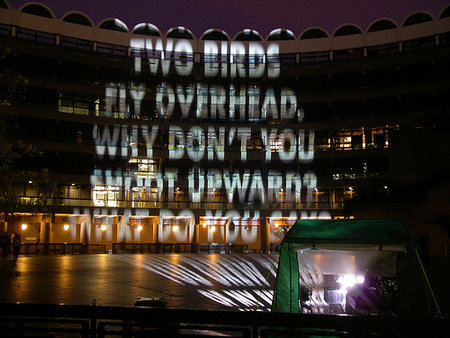
A recent literary event provided a chance for an extended chat with various people about the possibilities for new types of readings. I’ve always thought they’re a bad way to appreciate lit, but they’re valuable in promoting new work, and bringing together like-minded people. What can we do about this?
Readings can, of course, be very good – when the author knows how to read their work, knows their audience, and communicates with them well, as was the case last week. They can also be hideously bad – straining to hear an author struggling to bring to life a narrative written to be read quietly to oneself, not out loud to a group. There’s also an element of buttonholing, particularly at multiple-author readings, reminiscent of support bands at big gigs trying to make themselves heard, and the resentment that bubbles up when one such reader goes on too long or picks the wrong passage to declaim.
The market for readings essentially arises from a rock star attitude to authors – that the quality of writing is enhanced by hearing it from the writer’s own lips, with the additional possibility of cross-questioning them and getting a signed copy after. Nothing I’ve ever seen or heard has made me support this view, despite occasionally enjoying evenings with authors who do know how to read their work. Likewise, Q&A’s are better served by informed, moderated discussion than hurried ‘any questions?’ when the requisite period of appreciative hush has been allowed to pass. Signings, I’m afraid, continue to mystify me, so I’m just going to ignore that aspect of the proceedings.
What I have always found most rewarding about readings are the conversations they evoke around the work in question, and the opportunity to meet others who appreciate it, which in turn is likely to lead one to new literary discoveries. Is there a way to present the work to groups who’ve gathered for the purpose, and maintain the significance of author presence, without the false construction of the author reading?
The simplest way would be to simply provide photocopied pages to the audience, and allow them to read the sample in their own time, although this seems reductive, and somewhat like a set text from an English lesson. I quite like the idea of projecting the text onto the walls of the venue, letting it scroll slowly upward, allowing attendees to engage and disengage at will, to dip into the text or become absorbed in it. Someone else suggested the possibility of more private readings – a discreet tap on the shoulder and the author whispers a few passages into your ear before moving on: more suitable to some texts than others. The challenge is to strike a balance between the traditional author-centred reading, and the reader-centred book group, and to allow new dialogues to emerge between both parties.
With the recently-announced inaugural London Literature Festival looming, booktwo.org and 3:AM are thinking of planning some alternative events on its fringes, possibly incorporating some of these ideas. If you have some thoughts on this, do share.
Photo of Jenny Holzer’s For London from Phil Gyford‘s Flickr stream, reproduced under Creative Commons license.
Comments are closed. Feel free to email if you have something to say, or leave a trackback from your own site.